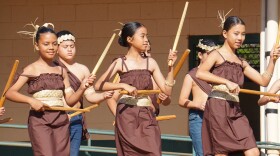The state Department of Health is preparing to release its COVID-19 safety recommendations for the upcoming school year. It shared the plan with close to 40 members of its School Advisory Council, including Philip Bossert who represents the Hawaiʻi Association of Independent Schools.
Bossert talked to The Conversation about the new guidance, as well as how private schools are planning for the upcoming year as Hawaiʻi records an uptick of cases of the more contagious delta variant. He said he expects the DOH recommendations to be officially released Friday.
He also sits on a separate board that is planning vaccination guidelines for children ages 5 to 12 — something expected to be released later this fall.
Below are excerpts from Bossert's interview, edited for length and clarity.
On what to expect for students returning to in-person learning
BOSSERT: So it looks like they sort of divided their recommendations into essential recommendations, and then also good ideas. And under essential, the number one is encourage everyone to get vaccinated. And number two is masking for all indoor events, all indoor classes and the like, but not necessarily for outdoor activities. So they're saying that if you're outside, these don't necessarily need masks. And then the social distancing, they've said, if you've got the space, go for 6 feet. But if you don't, 3 feet is fine in classrooms, and ideally, having your students all face the same direction. And they do say that while the students can be 3 feet apart, that the distance between adults and students should ideally be 6 feet.
And then they drop down to the second group of recommendations, which includes the increased ventilation of spaces, and the use of what they call those ʻohana bubbles. If you can keep classes together, not only in the classroom but when they go out for recess, try to keep them together too so that if someone does test positive, you know who they've been in contact with.
And then in cafeterias, when the students are eating, they don't have to wear a mask, obviously, but you should try to keep them 6 feet apart while they're eating. Before they were saying, have the meals in the classroom in the ʻohana bubble. But now they're saying it's okay, back in the area.
One of the items that was in the old recommendations was that a student shouldn't be allowed to come back to class after they have been in the vicinity of someone who was infected, that there should always be a doctor's note for them to get back into the class and after their quarantine. So now they're saying, you know, if you've quarantined for 10 days and don't have any symptoms, you don't have to go also get a doctor's note. The doctors just didn't want to be overwhelmed with you know, hundreds of kids showing up every morning looking for a note.
On what Hawaiʻi's private schools are planning for the upcoming school year
BOSSERT: There are about 112 private schools, of which about 100 are members of HAIS. We got a response rate of about 59, which is unusual, even for us. We asked questions like, "Are you going to require vaccinations for in-person classes? Are you going to require masking?"
In terms of vaccination, almost none of the schools said they were going to require it, but they would all encourage it for students 12 and older, and faculty and staff — so not requiring but encouraging that. In terms of masking, I would say 75% are going to require masks at all grade levels, for sure indoors. Then depending on the school, it was less so for outdoors. So that when the kids are out at recess or extracurricular activities, there would be a little more allowance for nonmasking.
And then we asked the question, "Are you going to do COVID testing?" Many of them did that in the past year. And 85% said no, no more COVID testing of students — on a daily basis type thing or a weekly basis. So if you have a problem or something or if you're infected, then of course you would be tested before you come back. But the daily or weekly testing, they were not basically going to do that. Even in the case of athletes and those kids in extracurricular activities, most of them say they wouldn't be doing the testing.
(Last year) almost every school had the temperature taking at drop off and stuff like that or filling out of the daily COVID form. But this year, only 25% said that they were going to continue with the daily form and temperature testing. 30% said no and 30% said they were undecided.
On how private schools interact with government guidelines and mandates
BOSSERT: The independent schools are each independent businesses. So they each have to make their own decision. We did encourage every school to come up with a COVID plan, which, as far as we know, they did. Most of the schools also wait or look to the Hawaiʻi Department of Health for their guidance, and so the Department of Health's school guidelines are recommendations. But you also have the Hawaiʻi Department of Human Services, which has responsibility for licensing preschools, and before- and after-school care. So theirs are not recommendations, those are mandates, requirements. So you have a set of guidelines coming out of the Department of Health for schools, and then usually a more restrictive set of guidelines, or mandates, coming out of Human Services for preschools, and before- and after-school care. So schools have to sort of navigate between those two in making up their own policies.
This interview aired on The Conversation on July 22, 2021.





